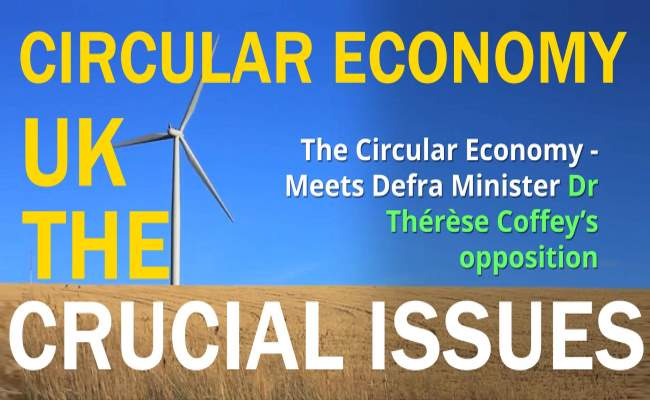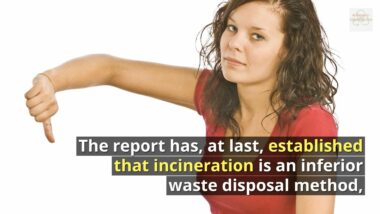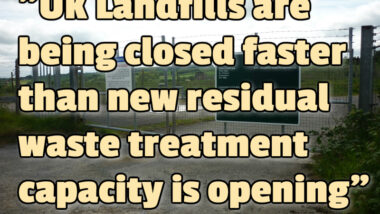A fuller title for this article would be; UK Circular Economy – Meets Defra Minister Dr Thérèse Coffey’s Opposition after Government Audit Office report shows a lack of rigour in the existing implementation of the EU’s policy for meeting circular economy (recycling) targets. We could have used that, but we can imagine that only the most determined reader will remain interested, unless we can make this subject more intelligible and relevant than that!
Is you interest waning in this subject? If so, we suggest that you watch our video below to get yourself up to speed in this subject! Do come back afterwards and give us comments and feedback. The Circular Economy needs a much wider airing than it has been getting within the waste management industry and politicians alone.
[box type=”info” size=”large” style=”rounded” border=”full”]Want to know exactly what we mean by the term “circular economy”? UK WRAP defines it as: “A circular economy is an alternative to a traditional linear economy (make, use, dispose) in which we keep resources in use for as long as possible, extract the maximum value from them whilst in use, then recover and regenerate products and materials at the end of each service life.”[/box]
In other words the idea of a circular economy is the next step after implementing recycling. After all, what good is it producing ever more recycled materials if nobody is going to use them in a planned and structured way within a managed economy?
As a commenter M. Brocklehurst on the CIWM’s website said:
“The consequences of not adopting the principles of the circular economy for a planet with a growing population are just awful. The story of plastics is just one example of why we need to change….
Plastics in our oceans are the reality of a linear economy out of control. It is time to accept the need for a Circular economy and put the economic drivers in place to make it a reality. Taxation on primary raw materials rather than on labour would be a start and yes a reduction in subsidies for the hydrocarbon industry.”
The following is the text which you will see in the video above:
UK Circular Economy Debate – Is the Big Idea all it is cracked up to be?
Some Big Claims have been made – net material savings of $340-630 billion across the EU, $1 trillion annual growth for the global economy by 2025, 3 million extra jobs and unemployment reduction by 520,000 across the EU by 2030.
The EU has no second thoughts and is pursuing further targets toward a full implementation of Circular Economy Principles.
But the voices of a few naysayers have begun to surface.
For example, Julian Allwood in the Handbook of Recycling (2014) questions whether a 1 to 1 substitution of secondary materials for primary raw materials or goods actually occurs in practice,
to the extent that is typically assumed by circular economy proponents.If not, environmental impacts from the secondary economy will add to the impacts of primary production, rather than displace/reduce these latter impacts.
Trevor Zink and Roland Geyer expand on this theme in a Market-Based Framework for Quantifying Displaced Production from Recycling or Reuse (2016) and in Circular Economy Rebound (2017), claiming that as with energy systems, improving resource efficiency and reducing raw material costs might lead to an increase in production that wipes out some of the environmental gains, or even to “backfire”, where the increase in use is proportionally greater than the efficiency increase, leading to higher net environmental impacts.
Decreasing aggregate demand – less production and less consumption – is recommended as one way of avoiding “circular economy rebound”.
While acknowledging the undesirability of over-consumption, arguing for de-growth is taking a first world perspective.
There remain huge swathes of population who have a right to economic betterment.
Indeed Zink and Geyer acknowledge in a footnote that; “there may be significant welfare benefits to increased connectivity in the developing world”.
For all its potential limitations, the CIWM Journal author, says that the circular economy offers a better way of achieving sustainable growth than the linear economy.
CIWM seems to suggest that rather than discarding the ‘Circular Economy” concept, it should be properly designed and applied.But, for a Big Idea that has gained so much political traction, the paucity of academic research, especially the input of academic research to inform policy making, is striking.
For example, we still lack a robust macroeconomic model.
Many of the Big Claims made by circular economy proponents have not been rigorously analysed or tested; some are based on over-optimistic assumptions.
We badly need a solid body of academic inquiry into the circular economy, to base circular economy policy in truth, and not over-promise on what it can achieve.
Circular economy fatigue has begun to creep in – enough armchair pontificating, now walk the walk.
But what the Waste Management Industry members are finding in the real world is that walking the walk, is proving more difficult than they have been led to believe.
Nirvana is not round the corner, but a hard slog away.
The text of this video is based on an article in CIWM Journal Online at http://ciwm-journal.co.uk/circular-economy-under-microscope/
Our View on UK Circular Economy Issues

No longer will UK politicians be able to take the lazy-way of the past, by just rubber-stamping EU Directives, and when the UK public finds out the consequences, simply wash their hands of all blame by pointing to the remote and EU’s bureaucratic systems of law-making.
This is not to say that the concept of the circular economy is not the best way forward, but for a policy as important as this, there simply has to be a high level of public debate before taxation and subsidies are introduced which will have the potential to have an enormous effect on the UK’s economy.
From now on for the “circular economy”, the debate has to start, and the sooner the better that the general public are made aware of the issues presented by both implementing the circular economy, or not implementing it.
Those that care about future generations are going to have to take their gloves off in the UK and make their case well, or like many other essentially positive EU policies, the UK will go backwards and fail to meet it’s potential to lead the world in technology and economic policy toward a much more sustainable (high employment) future.
The Future of UK Food Waste Management – Simpler Collections and Tougher Regulation
The future of UK food waste management will be a big push toward higher recycling rates through simpler collection and far greater consistency across the nations, helping citizens understand how to be green and recycle more organic waste. As the UK continues to advance its environmental goals, recently announced government policies aimed at simplifying waste […]
The Ultimate Guide To Recycling Plasterboard: How To Dispose Of Plasterboard Waste Properly
Plasterboard is a popular building material used in homes and offices. It’s light, strong, and easy to work with. But when it turns into waste, we can’t just throw it away like old food wrappers. Rules say plasterboard must not mix with other trash because it can harm the environment. Luckily, clean plasterboard can go […]
Unfashionable Talk About Landfills
Get ready for unfashionable talk about landfills! Let’s talk rubbish—literally. You might not think about landfills much unless the smell drifts your way on a windy day or you’re tossing out the garbage. But these dumping grounds are more than just piles of junk; they’re a snapshot of our consumer habits and a challenge we need to tackle. Landfill […]
Street Sweeper Waste Management: A Comprehensive Guide
This is a story that ranges from cleaning streets to sustainability. Jump aboard as we uncover the fate of street sweeper waste. In the bustling streets of cities worldwide, street sweepers play a pivotal role in maintaining cleanliness and public health. However, the journey of the waste they collect is often overlooked. This article dives […]









